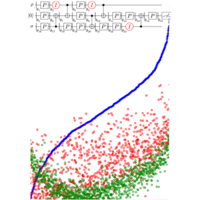Abstract
Noise mitigation and reduction will be crucial for obtaining useful answers from near-term quantum computers. In this work, we present a general framework based on machine learning for reducing the impact of quantum hardware noise on quantum circuits. Our method, called noise-aware circuit learning (NACL), applies to circuits designed to compute a unitary transformation, prepare a set of quantum states, or estimate an observable of a many-qubit state. Given a task and a device model that captures information about the noise and connectivity of qubits in a device, NACL outputs an optimized circuit to accomplish this task in the presence of noise. It does so by minimizing a task-specific cost function over circuit depths and circuit structures. To demonstrate NACL, we construct circuits resilient to a fine-grained noise model derived from gate set tomography on a superconducting-circuit quantum device, for applications including quantum state overlap, quantum Fourier transform, and -state preparation.
9 More- Received 15 July 2020
- Revised 30 December 2020
- Accepted 21 January 2021
DOI:https://doi.org/10.1103/PRXQuantum.2.010324
Published by the American Physical Society under the terms of the Creative Commons Attribution 4.0 International license. Further distribution of this work must maintain attribution to the author(s) and the published article's title, journal citation, and DOI.
Published by the American Physical Society
Physics Subject Headings (PhySH)
Popular Summary
The rise of quantum computing over the past few years is incredibly exciting. In the near future, quantum computers may be large enough to outperform classical computers for practically interesting problems like simulating chemistry. But everyone agrees that this will not be possible without intense effort to reduce the impacts of noise on quantum circuits. A central open question is, therefore, how to design quantum circuits that minimize the accumulation of noise.
There is a recent history of machines outperforming humans at various tasks, including games (like Chess, Go, Jeopardy) and even tasks that humans have evolved to excel at (like facial recognition). Now imagine a task for which humans have essentially zero intuition: designing quantum circuits. Let us make the task even more complicated by having a device-specific noise process, so that the goal is to design a circuit that runs well on a given quantum computing hardware. Is there any doubt that a machine could perform this task better than a human?
In this work, we develop a framework to leverage the incredible advances in the field of machine learning for the purpose of designing noise-resilient quantum circuits. We train our circuits in the presence of a noise model for a specific device, so that the circuit evolves to be immune to the noise on that device. This is analogous to taking a vaccine, to become immune to a virus. Indeed, with our new framework, we demonstrate significant reductions in the computational error for key computational tasks under experimentally derived error models for superconducting-qubit quantum computers.



